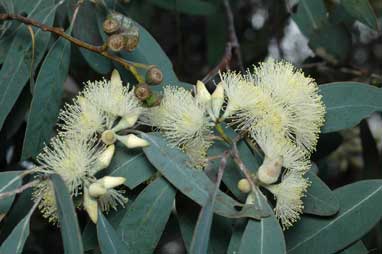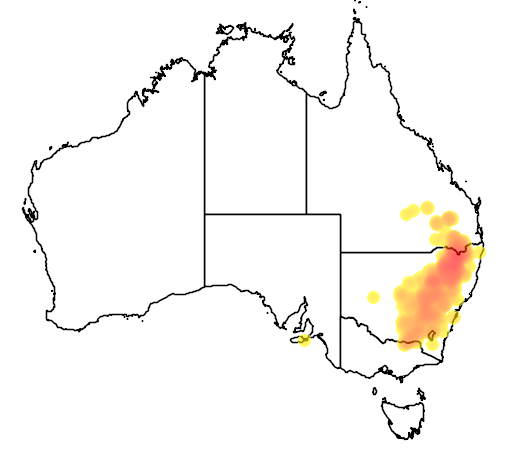Description
Common names
Tumbledown Gum, Tumbledown Red Gum, Hill Red Gum, Silver Gum, Baradine Gum, Blue-leaf Gum, Hill Redgum, Inland Red Gum, Mountain Gum, Red Gum, Tumble-down Red Gum, White Gum.
Scientific names
Eucalyptus dealbata.
Family
Myrtaceae.
Genus
Eucalyptus.
Name origin
Dealbata, meaning white-ashed, referring to hue on leaves, particularly in autumn.
Rainfall
400mm.
Growth height
Up to 15m.
Presence in Australia
Usually on dry rocky hills. Noted in the following areas Urana-Rand-Corowa; Long Plain-West Hume; Majors Creek; Burrumbuttock-West Hume; Deadmans-Bungowannah-Long Flat; Albury district; Yambla; Mountain Creek-Native Dog-Sandy Creek; Sawyers-Forest-Four Post & Little Billabong; Boree; Narrandera-Morundah-Galore-Collingullie; Coreinbob & Carabost.
This specie has been identified in the following Australian states: Qld, NSW, ACT, Vic, SA.
Habitat
Grassy woodland on skeletal soils, usually on basic rocks. Also with White Cypress Pine (Callitris glaucophylla).
Habit
Straggly tree to 15m high with smooth bark shedding in large plates or flakes. Narrow grey-green adult leaves. Varies in form depending on site quality. More mallee-like on poorer sites.
Similar species
Resembles Blakely"s Red Gum (E. blakelyi), particularly on better sites. Distinguished from Dwyer"s Red Gum (E. dwyeri) by its wider leaves, especially in seedlings. See Practical Information Note - The Red Gum Story.
Site preference
Tolerates most frost and dryness once established.
Flowering
White, winter to early summer.
Propagation
From seed.
Shade and shelter
Useful medium-level cover in windbreaks.
Land protection
Useful for recharge plantings.
Timber
Durable in ground. Suitable for fencing and heavy construction, although trees often crooked. Potential for woodlot planting.
Wildlife
Birds attracted to good supplies of nectar and pollen. Hollows are nesting and refuge sites for many native birds and mammals.
Ornamental
Decorative specimen for larger gardens and parks. Saplings develop crown of attractive broad silvery leaves.
Other
Very important in NSW due to pollen production for apiculture.


